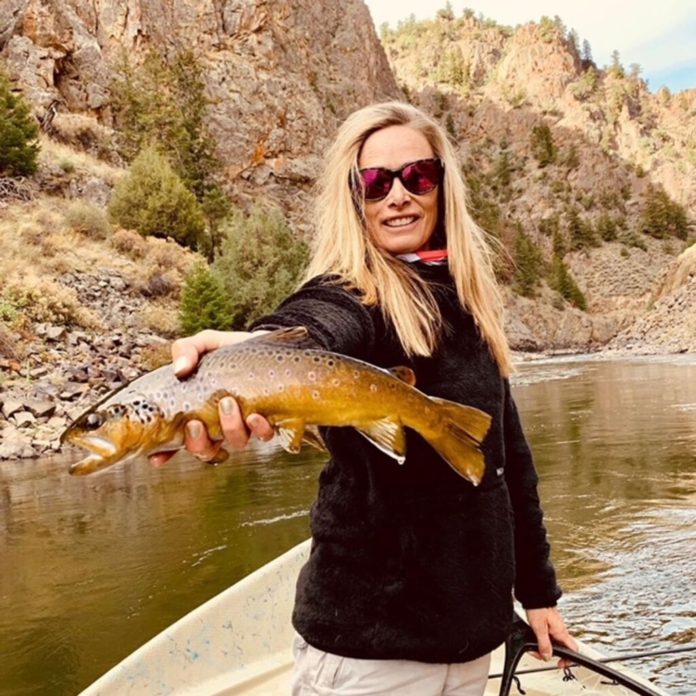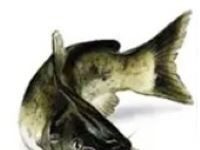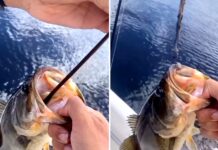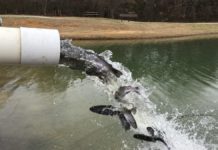Jeanette McQuade/Courtesy Photo
Many know, and many more have recently come to know, that time spent outdoors can boost mental well-being. For a few Grand County locals, conservation work and fly fishing have been a boon to their mental health. And luckily rivers, streams and lakes abound in the area for these locals to find their solace.
Carrie Hanneke, a resident of Fraser, spends the limited time she has to herself these days fly fishing. During the pandemic she had a baby, so that time has narrowed considerably, but her time on the water couldn’t be more important to her mental health. Eight days after her daughter was born, she was on the river without intention other than to calm her rattled mind. Nine months after giving birth, news of a second breast cancer diagnosis nearly wiped her clean of all sense of normalcy. So what did she do? She regularly waded into the Fraser River right near her house to find peace, calm and to come away rejuvenated to tackle life’s many curve balls.
The sounds of the river is what Carrie immediately notices. The gurgles of the Fraser flowing over rocks and plunging into pools, and the soft, constant murmur of the river flowing in riffles. The bird calls and chances at seeing other wildlife all excite her, but it is certainly the entire package that allows her mind to relinquish its grip on her adversities and simultaneously zone out yet find focus and clarity to bring to her life off the river.
With the ravages her body’s been through with one cancer diagnosis and the subsequent treatments, having a child, and then more treatments for cancer, Carrie realized her body just wasn’t able to do the things it used to do; like take her deep into the mountains on her mountain bike. So fishing rose to the top of her list of favored activities. A few years ago, she challenged herself to get out alone and fish, and during a typical mid-summer, high-country Colorado snowstorm, she caught one of the bigger rainbows of her life. She now feels she has the skills to go out at any time, catch fish (or not), and come away rejuvenated.
Carrie Hanneke/Courtesy Photo
Now Carrie relishes spending even 30 minutes in the Fraser River. She knows fly fishing is something you never finish learning, which is one of its appeals to her, and she relishes the thought of so many great groups giving back to the sport by taking people out in unfortunate situations. One is Casting for Recovery, which organizes retreats for anyone at any stage of breast cancer. Another is the MayFly Project, which mentors foster kids through fly fishing. Once she has more than a free moment to herself, Carrie hopes to pass along the gift of fly fishing to those who need it for their mental health.
Jerry Nissen
For years, the rivers themselves are what drew Jerry Nissen, of Fraser, to a state of improved mental health. He’d often ride his mountain bike up St. Louis Creek from the Deadhorse parking lot with or without a fly rod in tow. He’d stop and watch the river go by and marvel at its power and resiliency for a couple hours. At times, he’d even find comfort in watching others fish, especially during the three years he was caring for his first wife who suffered from Lou Gehrig’s disease, also known as ALS. He always came away recharged.
Now the roles have reversed. Jerry is no longer able to visit far away spots to find calm thanks to the unsteadiness that came with his diagnosis and subsequent treatments of stage four pancreatic cancer. Luckily for him the Fraser River and the Colorado River are easily accessible in many places in Grand County. Walks along them allow him to wake up another day to fight for his life and for the rivers.
Since fly fishing is no longer an option, Jerry is dedicated to the conservation of the rivers he loves. For this reason, he was drawn to Trout Unlimited’s work and still sits on the board of the local Colorado River Headwaters chapter. Jerry knows that if we don’t work to save our rivers now, they won’t be there for future generations to find the same solace.
Much of his work will culminate with the realization of the Windy Gap Project set to break ground in the coming months. Reconnecting a mile of the upper Colorado River will offer much improved habitat for trout and other aquatic life, offering anglers and other river users a healthier river.
And in the end, that’s what it is all about for Jerry: healthy rivers. With his limited time remaining on this planet, Jerry regularly walks the paths along Grand County’s rivers to reconnect with the flowing water that brings him so much joy and peace.
Jeanette McQuade
Jeanette started fishing about 10 years ago to spend more time with her partner who guides fly fishing, but she never realized how integral it would be to her life during and after the pandemic.
The Fraser Public Library, where Jeanette works, was not spared from staffing challenges and many of the other stresses that came along with trying to run a public resource at a time when no one could visit such places. Fishing helped Jeanette through.
Floating the Upper Colorado River is her preferred close-to-home fishing outing. With its broad banks and healthy fish, she chucks streamers at the banks for both the exhilaration of watching a big trout chase it down as well as the quietude it brings. When floating down a river waiting for a fish to eat, Jeanette feels suspended in time. There are no to-do lists; neither worries nor stresses have the space to creep in when she is focused on the fly and the potential fish attached to it.
Jeanette also utilizes yoga and meditation to calm her mind, but she often finds fly fishing instantaneously focuses her mind where while doing the other activities she finds thoughts and worries creeping in. During the pandemic and after eight funeral services for close friends, fishing was the only thing that got her through. While she prefers multi-day floats to better allow her mind to completely relax, the Upper Colorado River is close to home and a bastion for her mental well-being. It offers time away from everything weighing her down, and she even enjoys the zen of untangling knots. Who woulda thought?
Knowing the multitude of ways rivers, and other water bodies, can bring about mental well-being should encourage us to connect, or reconnect, with them. Water is life, as many indigenous cultures profess, so no matter how you interact with them, know it brings a healthy state of mind.
Kara Armano is a longtime angler, a cancer survivor, and member of Trout Unlimited. For more stories like this, pick up Trout Unlimited’s spring issue of TROUT by becoming a member or on the online magazine.
Credit: Source link





























